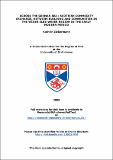Files in this item
Across the German sea : Scottish commodity exchange, network building and communities in the wider Elbe-Weser region in the early modern period
Item metadata
| dc.contributor.advisor | Murdoch, Steve | |
| dc.contributor.author | Zickermann, Kathrin | |
| dc.coverage.spatial | 209 | en_US |
| dc.date.accessioned | 2010-07-02T13:28:43Z | |
| dc.date.available | 2010-07-02T13:28:43Z | |
| dc.date.issued | 2009 | |
| dc.identifier.uri | https://hdl.handle.net/10023/958 | |
| dc.description.abstract | This thesis analyses the commercial, maritime and military relations between Scotland and the cities and territories in the North Western parts of the Holy Roman Empire during the early modern period; specifically Hamburg, Bremen, the Swedish duchies of Bremen and Verden, Danish Altona and Braunschweig-Lüneburg. Having identified anomalies in the histories of these locations, and bringing a more international dimension to them, my study tackles a remarkable understudied geo-political location. The core of my research identifies the immigration of Scots and the establishment of commercial networks within a region rather than an individual territory, highlighting contact across political borders. This region differed significantly from other places in Northern Europe in that it did not maintain an ethnically distinct Scottish community enforcing and encouraging interaction with the indigenous German population and other foreigners such as the English Merchant Adventurers in Hamburg. The survey reveals that despite the lack of such a community the region was of commercial significance to Scots as evidenced by the presence of individual Scottish merchants, factors and entrepreneurs whose trade links stretched far beyond their home country. Significantly, these Scots present in mercantile capacities were demonstrably linked to their countrymen who frequented the region as diplomats and soldiers who frequently resided in the neutral cities of Bremen and Hamburg. Some of these Scots within the Swedish army were of importance in the administration of Swedish Bremen-Verden while others fought for Braunschweig-Lüneburg. Their presence encouraged chain migration, particularly offering shelter to Scottish political exiles in the later seventeenth century. Analysing the collective role of these men and the relationships between them, this thesis highlights the overall significance of the wider Elbe-Weser region to the Scots and vice versa, filling a gap in our understanding of the Scottish Diaspora in the early modern period, and broadening our understanding of the region itself. | en_US |
| dc.language.iso | en | en_US |
| dc.publisher | University of St Andrews | |
| dc.subject.lcc | DD801.N4Z5 | |
| dc.subject.lcsh | Scots--Germany--Lower Saxony--History | en_US |
| dc.subject.lcsh | Scotland--Emigration and immigration--History--18th century | en_US |
| dc.subject.lcsh | Scotland--Commerce--Germany--Lower Saxony--History | en_US |
| dc.subject.lcsh | Scotland--Foreign relations--Germany--Lower Saxony--History | en_US |
| dc.title | Across the German sea : Scottish commodity exchange, network building and communities in the wider Elbe-Weser region in the early modern period | en_US |
| dc.type | Thesis | en_US |
| dc.type.qualificationlevel | Doctoral | en_US |
| dc.type.qualificationname | PhD Doctor of Philosophy | en_US |
| dc.publisher.institution | The University of St Andrews | en_US |
This item appears in the following Collection(s)
Items in the St Andrews Research Repository are protected by copyright, with all rights reserved, unless otherwise indicated.

